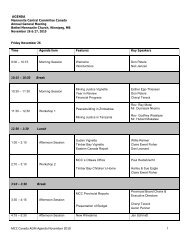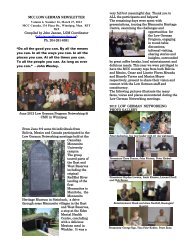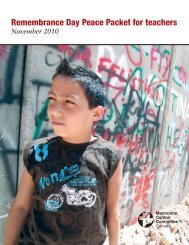to download PDF - Mennonite Central Committee Canada
to download PDF - Mennonite Central Committee Canada
to download PDF - Mennonite Central Committee Canada
You also want an ePaper? Increase the reach of your titles
YUMPU automatically turns print PDFs into web optimized ePapers that Google loves.
Fighter Pilot learns peace:the s<strong>to</strong>ry of Javier PinzónJavier was a colonel for the Colombian Air Forcefor over 30 years. He had a very successful militarycareer and even became pilot for the presidentialaircraft. Javier had been a Christian for manyyears, but in his church, believing in Jesus did notconflict with actions that hurt others. He had alsobeen disappointed with this church time and timeagain because of hurtful divisions and conflicts.Javier in theColombianAir Force.Looking for a different church experience, Javierarrived at the door of a <strong>Mennonite</strong> Brethren congregation.He began <strong>to</strong> understand the practical implications of following Jesus.What challenged him the most was the idea of following Jesus in his way of peace, nonresistance,and love for the enemy.It was during this time that he and his family were victims of a bomb attack at the handsof one of Colombia’s illegal armies. They had gone out <strong>to</strong> spend the evening in a recreationclub in Bogotá. An insurgent group had placed a bomb that blew up and destroyedthe building just minutes after they arrived. The family was engulfed in flames and smoke,but, miraculously, God rescued them!Facing such an experience could have hardened Javier’s heart; he might have decided <strong>to</strong>respond with resentment and military action against illegal armed groups in Colombia.Instead Javier became even more convinced as a pacifist. He eventually renounced his militarycareer, and now he serves as a <strong>Mennonite</strong> Brethren pas<strong>to</strong>r.The <strong>Mennonite</strong> church in Colombia has been engaged in efforts <strong>to</strong> uphold the right <strong>to</strong>object <strong>to</strong> military service by reason of conscience. This has included lobbying the governmentand facing legal battles <strong>to</strong> protect seminary students from being conscripted. Severalyears ago when the Colombian government closed down a <strong>Mennonite</strong> seminary, it wasonly thanks <strong>to</strong> hundreds of letters from North American churches <strong>to</strong> the Colombiangovernment that the seminary was reopened.Activism bears fruit: the s<strong>to</strong>ry of Richard SteeleRichard Steele is a South African former anti-apartheid activist who draws a close tiebetween his CO experience and the successful struggle <strong>to</strong> end apartheid. He was part ofthe Baptist church, but during the 70s he learned about peace and non-violence from<strong>Mennonite</strong>s when he came <strong>to</strong> study in North America. Some people think that Richardserved as a personal channel through which the Anabaptist position on militarism wasconveyed <strong>to</strong> South Africa.Richard, who went <strong>to</strong> prison for resisting conscription in the South African military,believes that his “End Conscription Campaign” became a seed <strong>to</strong> empower white antiapartheidactivists. It helped them realize that the system they had been taking for grantedcould be challenged. This was a time when the military apparatus was identified by criticsas a chief pillar of apartheid, the government’s scheme of social engineering along raciallines.As his<strong>to</strong>ry unfolded, apartheid came <strong>to</strong> an end and South Africa became a witness <strong>to</strong> theworld that truth and reconciliation are a viable political alternative <strong>to</strong> violence.13 S<strong>to</strong>ries and reflections











